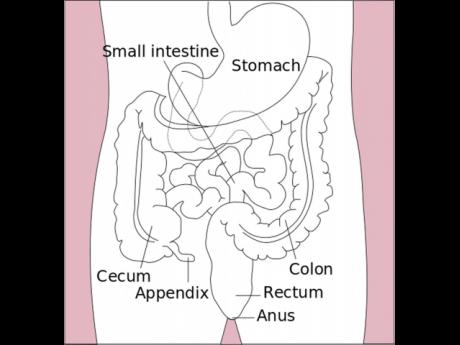Good nutrition and colon health
Understanding the benefits of a soft food diet, to establishing regular eating habits, nutrition can play an important part in your journey when you are faced with a colorectal cancer diagnosis. Eating a well-balanced diet before, during, and after cancer treatment can help you feel better, maintain your strength, and speed your recovery.
Colorectal cancer is a disease in which cells in the colon or rectum grow out of control. Sometimes it is called colon cancer, for short. The colon is the large intestine or large bowel. The rectum is the passageway that connects the colon to the anus.
Sometimes abnormal growths, called polyps, form in the colon or rectum. Over time, some polyps may turn into cancer. Screening tests can find polyps so they can be removed before turning into cancer. Screening also helps find colorectal cancer at an early stage, when treatment works best.
As the fourth leading cause of cancer-related deaths in men and women in Jamaica, the link between colon health and colorectal cancer needs to be understood. The Non-Communicable Diseases and Injury Prevention Unit, Ministry of Health and Wellness (MOHW), is giving focus to the nutrition aspect of its public health education agenda.
COLORECTAL CANCER PREVENTION
“The food you eat plays an important role in the health of your digestive system, which includes the colon. Colon health is linked to good nutrition. Nutrition and lifestyle interventions can therefore aid not only in prevention but so too, management, should you be diagnosed with colorectal cancer,” according to Dr Nicola Skyers, director, Non-Communicable and Injury Prevention at the MOHW.
A growing number of studies have found that chronic inflammation and chronic diseases such as type 2 diabetes and heart disease are associated with cancer. (Harvard Health Publishing, April 2018). Avoiding foods that are associated with inflammation, such as fatty foods and processed food, while reducing stress, engaging in physical activity and eating a well-balanced diet should be the general direction for everyone.
For persons that are looking to prevent colorectal cancer, you can partake in good sources of whole grain foods including oatmeal, colourful fruits and vegetables, whole wheat bread, brown rice and ground provisions such as yam, pumpkin, sweet potato, dasheen and coco.
The most healthful fats are monounsaturated and polyunsaturated fats, which include omega-3 and omega-6 fatty acids, nuts, seeds, avocados/pears. It is always best to choose baked (except pastry), broiled, stewed, boiled, instead of fried foods.
Persons should also avoid trans fats such as partially hydrogenated oils, shortening, lard and margarine, and be sure to limit the amount of saturated fat in the diet, for example, butter.
“Excessive salt intake has been shown to significantly increase the risk of some cancers, including colorectal cancer and stomach cancer,” said Dr Sharon Dawson, clinical nutritionist at the MOHW.
Washington University School of Medicine in St Louis has also found a link between drinking sugar-sweetened beverages and an increased risk of developing colorectal cancer. The findings suggest that heavy consumption of sugary drinks during adolescence between ages 13 to 18 years and adulthood can increase the chances of colorectal cancer disease.
Should you be diagnosed with colorectal cancer, here are some nutrition tips to follow:
• It is important to maintain a healthy weight. People with colorectal cancer need to consume extra healthy sources of calories and protein and may need to supplement with certain nutrients to prevent deficiencies and excess weight loss in order to better cope with treatment-related side effects. Treatments such as chemotherapy, radiation, and surgery for colorectal cancer can often contribute to unintentional weight loss.
• Eating small, balanced, frequent meals throughout the day will ensure that your body is getting enough of what it needs – calories, protein and other nutrients to better tolerate treatment. Having smaller portions may also help to reduce the uncomfortable side effects of treatment such as nausea. Try eating five to six small meals or ‘mini’ meals about every three hours.
• Choose protein-rich foods; protein helps the body repair cells, tissues and strengthen the immune system. Good sources of protein are lean meat such as fish, chicken, eggs, beans, peas, nuts and low-fat dairy products such as milk, yoghurt, cheese and dairy substitutes, for example, soy milk.
• Fruits and vegetables offer the body vital vitamins, minerals and antioxidants, which can help fight against cancer. Aim to have a minimum of five servings of whole fruits and vegetables daily. Your doctor may make adjustments based on your treatment.
• Whole-grain foods are a good source of carbohydrates and fibre, both of which help keep the body’s energy level up. Your doctor may make adjustments based on your treatment.
• Limit sweets and added sugars. Food’s high in added sugars like desserts and sweets provide little nutritional benefit and often take the place of other foods that are better for you.
• Stay hydrated. Drinking enough fluids during cancer treatment is important for preventing dehydration. Aim to drink 64 ounces of fluid daily. Avoid drinking large amounts of caffeinated beverages. Too much caffeine can lead to dehydration.
• Be observant of changes in bowel habits. Colorectal cancer and treatments can often lead to changes in bowel habits including diarrhoea, constipation, bloating, and gas. It is important for you to communicate with your doctor of any changes in your bowel habits. Changes in your diet or medications may be necessary to manage these side effects.
SOURCES: Harvard Health Publishing, April, 2018, ncdip.moh.gov.jm, sciencedaily.com . Centre for Disease Control and Prevention

